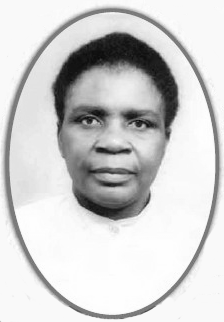Kapelwa Sikota facts for kids
Kapelwa Sikota (born 1928, died 2006) was a very important person in Zambian history. She was the first Zambian woman to become a fully qualified nurse. This happened in the 1950s. At that time, Zambia was called Northern Rhodesia. It was a British territory.
Kapelwa trained as a nurse in South Africa. Nursing schools were better there back then. When she returned home, her qualifications were not fully accepted. But after Zambia became independent in 1964, things changed. She quickly got important nursing jobs. By 1970, she was the Chief Nursing Officer. This meant she was in charge of all nurses in the country. In 2011, after she passed away, she was honored for her great work.
Her Early Life
Kapelwa Mwanang'umbi Sikota was born on July 7, 1928. She grew up in a place called Mongu District in Barotseland. Her father passed away when she was young. One day, when she was a girl, she was in a hospital in Mongu. She noticed something important. There were no Zambian women nurses working there. This included nurses for new mothers. This experience made her want to become a nurse herself.
In 1953, she married Aggrey Mulala Sikota. He was a medical assistant and was active in politics. Later, he became a government official. Kapelwa and Aggrey had four children together.
Her Education Journey
Kapelwa went to school at a time when it was hard for girls to get a good education in Zambia. She went to primary schools in Western Province. Then, she attended Chipembi girls' boarding school. This school was about 75 kilometers north of Lusaka.
Her brother helped her go to a mission school. It was near Durban, South Africa. She finished her secondary education there. After that, she enrolled at McCord Hospital to train as a nurse. This hospital was known as McCord Zulu Hospital. It was a hospital for black people. Kapelwa even learned the Zulu language while she was there.
She finished her nursing training in 1951. She was very good and won the "Best Nurse of the Year" award. She then trained for another year to become a midwife. This meant she could help women give birth. Kapelwa was the first Zambian African to become a State registered nurse. She was also the first State certified midwife.
Her Nursing Career
Kapelwa came back to Zambia in 1952. She started working at Lusaka Central Hospital. Today, this hospital is called University Teaching Hospital. She was the first African registered nurse to work there. In those days, many health workers in Africa were called assistants. They worked under European nurses or doctors.
For a short time in the 1950s, Kapelwa worked at Roan Antelope Mine Hospital. This hospital was in Luanshya. She supervised trainee nurses at a mining company hostel. In 1960, a British politician named John Stonehouse asked about her. He wanted to know why mining companies were not hiring her as a fully qualified nurse. He felt she was facing unfair treatment.
The Secretary of State for the Colonies, Iain Macleod, replied. He said he did not think she was being stopped from any job because of unfair treatment. However, Kapelwa's son, Sakwiba Sikota, said his mother was involved in the fight for Zambia's independence. She and her husband even held political meetings at their home.
On November 1, 1964, Zambia became an independent country. Just one week later, Kapelwa was promoted. She became Sister-in-Charge at University Teaching Hospital (UTH). She was the first African to hold this important role. The government also started programs to train more nurses. These were called "enrolled nurses."
By 1971, Kapelwa Sikota was the Chief Nursing Officer. She gave out graduation certificates to some of these new enrolled nurses. She held many important jobs in nursing and midwifery. In 1966, she became assistant Matron-in-Chief at the Ministry of Health. Later, she became the first African Chief Nursing Officer for Zambia.
Kapelwa helped write the 1970 Nursing Act. This law created the General Nursing Council of Zambia. This council helps manage nursing in the country. She also helped develop modern facilities at UTH. In 1974, she went to France with her husband. He had a diplomatic job there.
When she returned, she worked on a new project. This project looked at using traditional Zambian healthcare. For example, it explored how traditional birth attendants could help modern medicine. Kapelwa Sikota retired in 1984. She passed away on May 30, 2006. In 2011, she was one of eleven women honored by the Zambian Association of University Women (ZAUW). They honored her for being a pioneer in her field.


